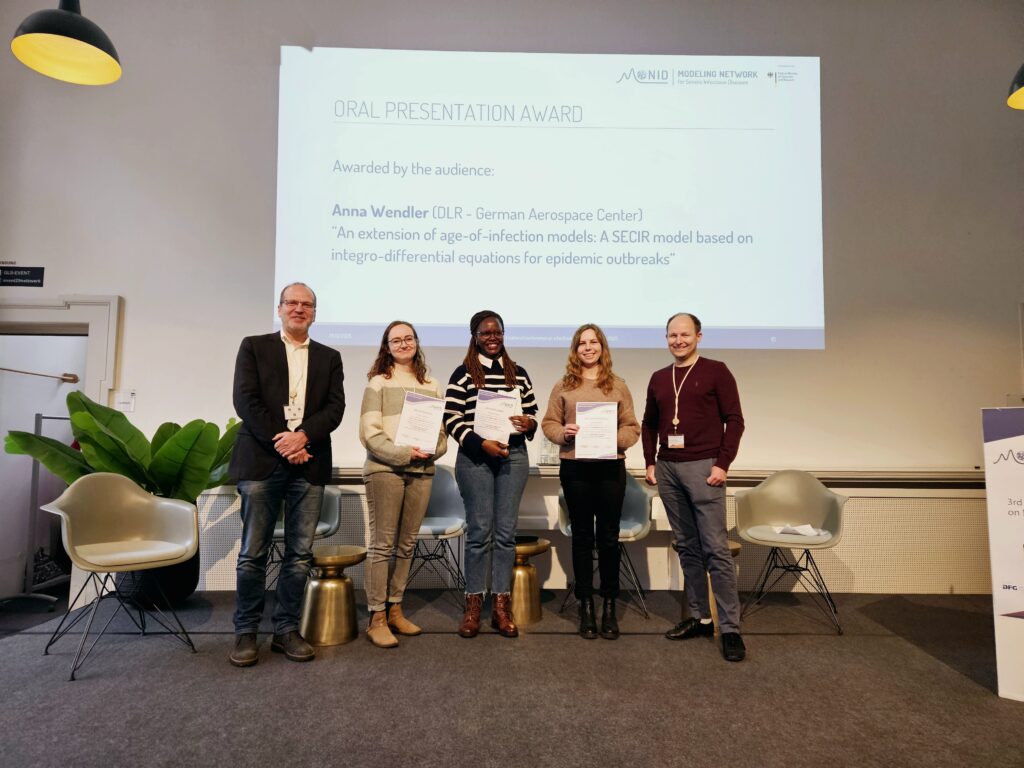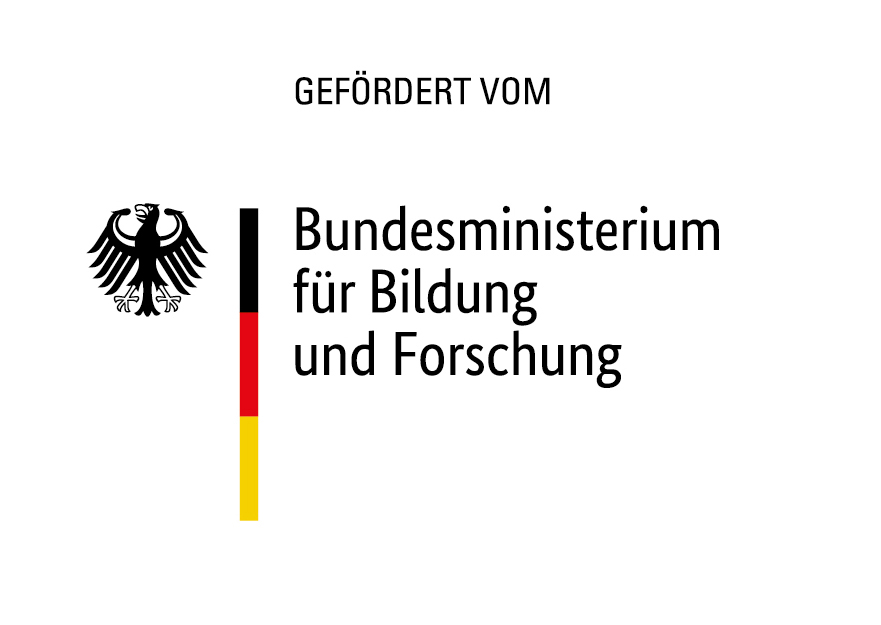The 3rd Annual Meeting of the Modeling Network for Major Infectious Diseases (MONID) focused on international networking: it brought together around 180 scientists from over 20 European and non-European countries in Berlin from 26 to 28 February 2025. The focus was on current and future challenges in the field of modeling infectious diseases such as COVID-19, influenza, meningococcal disease and Ebola.
With parallel lecture sessions, mini-symposia, keynotes, poster sessions and a science slam over three days, the conference provided an opportunity to discuss the latest findings with experts in mathematical modeling of infectious diseases and numerous related disciplines. As part of the “project updates”, the ten participating networks of the modeling network funded by the Federal Ministry of Education and Research (BMBF) presented their previous research work and successes and gave an outlook on possible future projects.
The topics of the sessions ranged from “Methodological research and transmission dynamics”, “Human behavior and contact structures” to “Advanced modeling methods in public health and infectious disease control”, “Technical implementation of models and applications” and “Inferences on contact patterns to understand disease spread: integration of mobile phone data”.
Prof. Dr. Alexander Kuhlmann (University of Lübeck/Martin Luther University Halle-Wittenberg, MLU), MONID board member and head of the coordination office, opened the conference and presented the research highlights and other successes from the three-year funding phase of the modeling network. He outlined the impressive growth of the network and spoke about the current status of MONID.
In her welcoming address, MinDirig’in Katharina Peter (BMBF) looked back on the developments since the start of the COVID-19 pandemic around five years ago. With the establishment of important research collaborations – such as the modeling network for severe infectious diseases in spring 2022 – it has become possible to better meet the challenges of the pandemic and future pandemics and to speak with one voice as a network. “I would like to thank all the scientists involved for their research contributions over the past few years,” said Peter, acknowledging the activities. She also addressed the increasing importance of artificial intelligence in a future funding period and emphasized the importance of international cooperation, “because infections do not stop at national borders”.
In his welcoming address, Prof. Dr. Lars Schaade, President of the Robert Koch Institute (RKI) and member of the MONID Scientific Advisory Board, emphasized the importance of joint projects in the field of infectious disease modelling, the promotion of young scientists and stronger networking. “The enormous growth of MONID is very impressive. I would also like to thank the MONID board, the steering group and everyone who has contributed to making the modeling network and its activities so successful,” praised Schaade.
The keynote speakers included two internationally renowned scientists: Prof.in Dr.in Alessia Melegaro, head of the multidisciplinary Covid Crisis Lab at Bocconi University (Italy), gave an interesting insight into the modeling of demographic trends and human behaviour in connection with the dynamics of infectious diseases with her keynote speech “From behavioural science to mathematical modelling: adding realism to infectious disease models” at the beginning of the conference. On the second day of the congress, epidemiologist Prof. Dr. John Edmunds from the London School of Hygiene and Tropical Medicine (UK, also a member of the Scientific Advisory Board) gave an inspiring keynote speech on “The use of mathematical modelling for decision-making in the UK” and, in the subsequent discussion with the participants, drew comparisons as to how well prepared countries are in the event of a new pandemic.
In addition to exciting presentations by internationally renowned experts from the modeling community and participants in the 48 Contributed Talks, there were 14 short presentations by young researchers in the form of elevator pitches – i.e. each about the length of an elevator ride. The predominantly young researchers also presented their projects in the poster sessions with three guided tours. In the Young MONID Panel, the coordinators of the initiative, Manuela Harries (Helmholtz Centre for Infection Research) and Dr. Beryl Musundi (MLU), briefly presented the status of activities to promote young researchers. Three inspiring talks by guest speakers Martín Lotto Batista (Barcelona Supercomputing Center, Spain), Maren Steinmann (Bielefeld University) and Julian Heidecke (Ruprecht-Karls-Universität Heidelberg) rounded off the session.
The “1st MONID Science Slam” on the first evening of the conference provided an entertaining start to networking at a get-together. In a 10-minute performance, the slammers presented a research topic to the general public in a humorous way – using PowerPoint slides, live performances, film and music interludes, among other things.
On Thursday evening, the MONID Scientific Advisory Board met with the Executive Board, the steering group and the project management organization Jülich as part of a committee meeting. The advisory board provided feedback on the progress of MONID and the expansion of collaborations.
At the end of the conference, MONID speaker Prof. Rafael Mikolajczyk (MLU) gave an outlook on the start of the second funding phase planned for the beginning of 2026 and presented this year’s MONID awards together with the Executive Board.
This year’s awards for the best poster presentations and the best oral presentation went to
- Anna Wendler (German Aerospace Center):
“An extension of age-of-infection models: A SECIR model based on integro-differential equations for epidemic outbreaks” (Oral Presentation Award) - Antonia Bartz (University of Münster):
“Usage characteristics of infection dynamic modelling in crisis management of German university hospitals during the COVID-19 pandemic” (Poster Award) - Dr. Beryl Musundi (Martin Luther University Halle-Wittenberg):
“Assessing the role of mass gathering events on the spread of infectious diseases: RESTART 3.0” (Poster Award)
We would like to congratulate all the award winners!

The next MONID conference is expected to take place in spring 2026. More information will follow.
(Feature photo: ©MONID/Evran Öztürk)
About MONID:
The Modeling Network for Major Infectious Diseases is a research network funded by the Federal Ministry of Education and Research (BMBF) since May 2022 with the aim of strengthening the interdisciplinary exchange of leading scientists from the relevant fields. MONID is a direct point of contact for inquiries from politicians regarding pandemics. In addition, the network is particularly committed to the promotion of young scientists and methodological training in order to sustainably strengthen modeling expertise in Germany and internationally. The MONID network is made up of seven affiliated and three associated research networks. The overarching coordination office is based at the Faculty of Medicine at Martin Luther University Halle-Wittenberg.
Background:
Infection epidemiology models are an elementary tool for a timely and targeted response in the fight against pathogens. They link existing knowledge, make it interpretable and enable predictions to be made about the dynamics of the spread of infectious diseases. This includes not only medical factors, but also social and psychological factors, such as contact behavior or containment measures that have been implemented. The more and the better the data included in a model, the better the correlations can be explained, possible effects can be estimated and possible trends can be predicted. In order to make statements that are as reliable and robust as possible, it is essential to involve experts from different scientific disciplines.
The promotion of research into new and already endemic pathogens is an essential part of this in order to make the knowledge and resources generated during the COVID-19 pandemic permanently usable for the future. In this way, Germany should be better prepared for future pandemics and modeling should be strengthened as a central instrument of policy advice in the long term. The conference therefore aims to provide a platform for the ongoing exchange and national and international networking of experts researching in this field.
Further information:
- to the program of the 3rd MONID Conference
- LinkedIn contribution of the BMBF to the 3rd MONID conference
The organization of the international conference was funded by the German Research Foundation (DFG) – project number 557908163.


